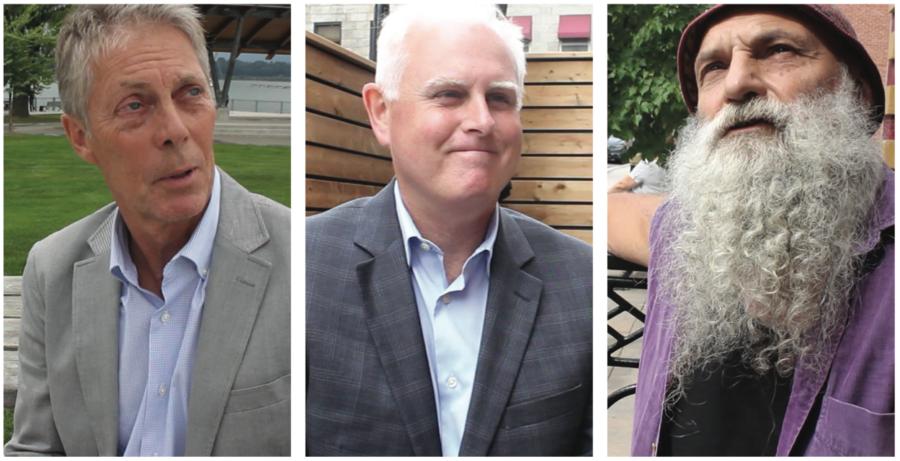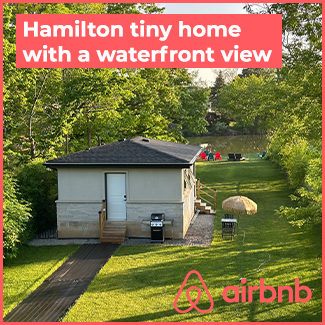
The most important election | Who’s who?
- Dev Team
- 03 Oct 2014
MICHAEL BALDASARO
Michael Baldasaro has been running for Mayor of Hamilton every year since 1985 with exception of one year he ran for Mayor of Guelph, and he has no interest in stopping. “The next election I’ll be 69. If I don’t get in this one, I’ll get in the next one.”
“When you stop working, you’re dying.”
Related: POLL OF THE WEEK: Will you be supporting your favoured candidate with a lawn sign?
“When I was young, we had chickens… and beautiful gardens in our backyards,” said Baldasaro who exclaimed disappointment on the sustainability of our city. “We are not self sustaining. We are living off a system that is feeding off of tax dollars instead of the businesses…”
Baldasaro, who has a background in labour work in all different areas of the city, including construction and manufacturing, also boasts a background education in law. “It’s about time we had somebody that understood the law, could read the law, and can litigate, and I can do that.”
“First of all I’ll take a third off my salary, and give it back to the city. It’s ridiculous how much money everybody is getting, and austerity begins at home.”
One of the main issues in Baldasaro’s eyes is the LRT, however he does not believe a line for McMaster to Stoney Creek is the answer, and would be much more interested in seeing “The Loop”, a line that would carry people North – South through downtown to the bay front. “Hamilton needs a heart, and that would be the heart.”
Baldasaro got even more heated about the subject of Randle Reef. “Why don’t we get the people that polluted it to clean it up. That I don’t understand! Is it because it was Stelco and Dofasco that we don’t—?”
As far as the downtown goes, Baldasaro thinks we are selling our buildings and land to Toronto investors too cheap. “They’re buying for pennies on the dollar, and ten years from now we could have make a heck of a lot more money,” said Baldasaro.
FRED EISENBERGER
This wouldn’t be Fred Eisenberger’s first time being Mayor of Hamilton if he were to win this October. Eisenberger was Mayor of the Hamilton from 2006 to 2010, after which he went on to be the President and CEO of the Canadian Urban Institute, an organization that strives to build and maintain healthy urban communities and development.
While there, Eisenberger was commuting back and forth from Toronto to Hamilton a lot. “I would say that was the primary reason I decided to come back to Hamilton,” said Eisenberger. “It was either the decision to move to Toronto, or come back to Hamilton to figure out what I wanted to do, and it turns out that that is what I wanted to do.”
“My passion is for Hamilton and I am going to do everything I can to make it better.”
“The main issue for Hamilton is, and will be, and continues to be economic development,” said Eisenberger.” He says that if we are going to grow as a city, we can no
longer be as reliant on the residential tax base as we currently are, and need to see a significant shift again to a commercial/industrial tax base. “We’ve lost a awful lot of business, and an awful lot of jobs went with it and we need to get them back.”
He also said he would like to see graduates from our colleges and university be employable in Hamilton rather than having to leave.
“The next Hamilton is about the new generation jobs— it’s a mix of things,” said Eisenberger. He went on to make note of Hamilton’s history of advanced manufacturing and the difficulties of the zoning category along Burlington Street. “Let’s see if we can maximize the potential of advanced, clean, new technology manufacturing.”
Eisenberger also sees advances in agribusiness for Hamilton’s, given that 75% of Hamilton’s landmass is agricultural, which could open opportunities for grow-local businesses as well as exporting.
As for as downtown Hamilton, Eisenberger says it’s all about taking those big opportunities, and not letting them go to waste. “For me it’s how we manage the next growth spurt, making sure that we appropriately place on existing infrastructure new development, with some appropriate density so that we can also capture some additional revenue off those opportunities.”
BRIAN McHATTIE
What some may not know is that this is, in fact, not Councillor (Ward 1) Brian McHattie’s first time running for Mayor. He ran back in 1997 against Mayor at the time, Bob Morrow.
“We’re focussed, to begin with, on stronger neighbourhoods. That’s something that I have had a lot of experience with over then last 11 years on council,” said McHattie who is on his way to completing a 100 days tour of neighbourhoods city-wide. “The diversity is just extraordinary.”
McHattie also wants to work towards more jobs for Hamilton. “Back in the good old days, if it was made in Canada it was probably made in Hamilton, and we are very proud of that.”
“We need to bring new jobs to Hamilton up in the industrial business parks, McMaster Innovation Park, the new industries—life sciences, health sciences, jobs for youths, and making it easier for entrepreneurs to start their own jobs.”
“We’re not a rich city, and we need a much better deal from the province of Ontario and the federal government to help us financially,” said McHattie. He also made not that property taxes in the City of Hamilton are “pretty much maxed out”.
“I think one of the things we need to do is to connect with resident a lot more strongly than we have,” said McHattie. In past years, McHattie along with other Councillor Farr of Ward 2 have taken an interest in participatory budgeting. “That a way of asking ‘what do you want to see in your neighbourhoods?’… and the budget process in this city should be run the same way.”
McHattie said that in spite of our shrunken industrial economy over the decades, Hamilton’s main export is still creativity and innovation which would include advanced manufacturing. He wants the city to continue to be known as a creative, open city, and that open government is beginning of that, which is of big interest of his.
As far as the downtown goes, McHattie is confident about the continuance of condominium project in the core, but also wants to see more jobs coming downtown and see office buildings like the Stelco tower fill up.
MICHAEL PATTISON
Michael Pattison is not satisfied with the current state of municipal politics — “disenfranchised with what politicians have been handing us for years.”
As Mayor, Pattison would seek to unify the city he loves, with his sights set on a more caring and determined Hamilton. Pattison talks a lot about galvanizing all of Hamilton’s wards into a unified voice for all, where everyone’s needs are heard. The greatest challenge in Pattision’s eyes for this city is the overcome any hindrance of becoming an “engaged citizenry”.
“VOTE. Hamilton. VOTE.”
RICKY TAVARES
Ricky Tavares is filled with piss and vinegar. Determined and on track. There is no doubt in his mind, “I will be the mayor of Hamilton, Ontario, Canada in the near future.”
Tavares’ platform is simple — austerity. “I will be the first mayor of Canada willing and proud to work for a minimum wage salary.”
Packed with natural confidence and a desire to lead, Tavares has accompanied himself with a team of colleagues to assist in a five-year plan that he says will generate $1 trillion in city coffers in just half a decade.
Brad Clark: Despite great efforts including multiple emails and phone messages, Mr. Clark did not respond to the opportunity to participate.
Crystal Lavigne: Due to scheduling difficulties Ms. Lavigne did not have the opportunity to participate.
Ejaz Butt: Mr. Butt did not respond to the opportunity to participate.
Nick Iamonico: Mr. Iamonico was not approached due to lack of contact information.
Comments 0
There are no comments


Add comment